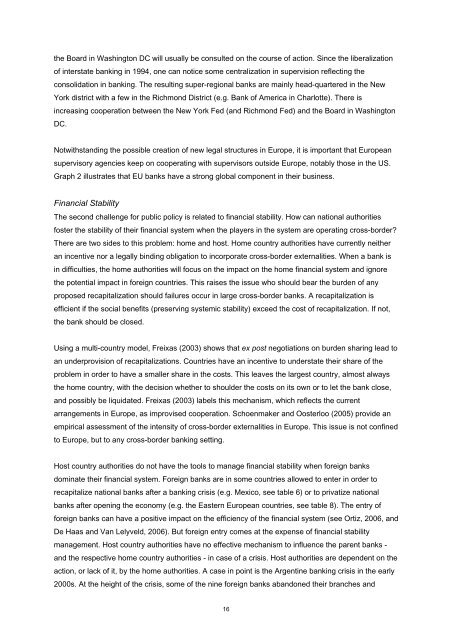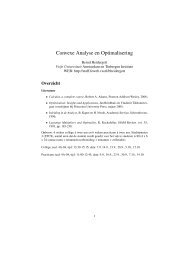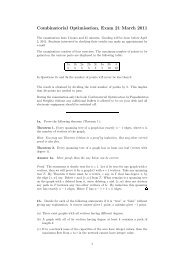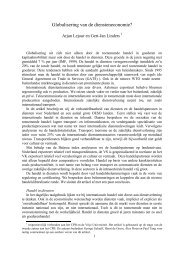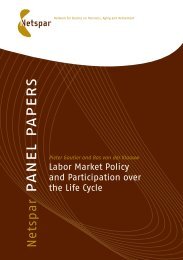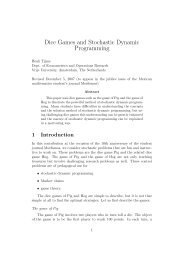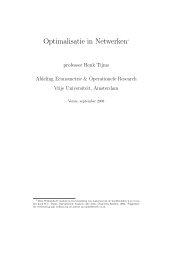Current State of Cross-Border Banking - Vrije Universiteit Amsterdam
Current State of Cross-Border Banking - Vrije Universiteit Amsterdam
Current State of Cross-Border Banking - Vrije Universiteit Amsterdam
Create successful ePaper yourself
Turn your PDF publications into a flip-book with our unique Google optimized e-Paper software.
the Board in Washington DC will usually be consulted on the course <strong>of</strong> action. Since the liberalization<br />
<strong>of</strong> interstate banking in 1994, one can notice some centralization in supervision reflecting the<br />
consolidation in banking. The resulting super-regional banks are mainly head-quartered in the New<br />
York district with a few in the Richmond District (e.g. Bank <strong>of</strong> America in Charlotte). There is<br />
increasing cooperation between the New York Fed (and Richmond Fed) and the Board in Washington<br />
DC.<br />
Notwithstanding the possible creation <strong>of</strong> new legal structures in Europe, it is important that European<br />
supervisory agencies keep on cooperating with supervisors outside Europe, notably those in the US.<br />
Graph 2 illustrates that EU banks have a strong global component in their business.<br />
Financial Stability<br />
The second challenge for public policy is related to financial stability. How can national authorities<br />
foster the stability <strong>of</strong> their financial system when the players in the system are operating cross-border?<br />
There are two sides to this problem: home and host. Home country authorities have currently neither<br />
an incentive nor a legally binding obligation to incorporate cross-border externalities. When a bank is<br />
in difficulties, the home authorities will focus on the impact on the home financial system and ignore<br />
the potential impact in foreign countries. This raises the issue who should bear the burden <strong>of</strong> any<br />
proposed recapitalization should failures occur in large cross-border banks. A recapitalization is<br />
efficient if the social benefits (preserving systemic stability) exceed the cost <strong>of</strong> recapitalization. If not,<br />
the bank should be closed.<br />
Using a multi-country model, Freixas (2003) shows that ex post negotiations on burden sharing lead to<br />
an underprovision <strong>of</strong> recapitalizations. Countries have an incentive to understate their share <strong>of</strong> the<br />
problem in order to have a smaller share in the costs. This leaves the largest country, almost always<br />
the home country, with the decision whether to shoulder the costs on its own or to let the bank close,<br />
and possibly be liquidated. Freixas (2003) labels this mechanism, which reflects the current<br />
arrangements in Europe, as improvised cooperation. Schoenmaker and Oosterloo (2005) provide an<br />
empirical assessment <strong>of</strong> the intensity <strong>of</strong> cross-border externalities in Europe. This issue is not confined<br />
to Europe, but to any cross-border banking setting.<br />
Host country authorities do not have the tools to manage financial stability when foreign banks<br />
dominate their financial system. Foreign banks are in some countries allowed to enter in order to<br />
recapitalize national banks after a banking crisis (e.g. Mexico, see table 6) or to privatize national<br />
banks after opening the economy (e.g. the Eastern European countries, see table 8). The entry <strong>of</strong><br />
foreign banks can have a positive impact on the efficiency <strong>of</strong> the financial system (see Ortiz, 2006, and<br />
De Haas and Van Lelyveld, 2006). But foreign entry comes at the expense <strong>of</strong> financial stability<br />
management. Host country authorities have no effective mechanism to influence the parent banks -<br />
and the respective home country authorities - in case <strong>of</strong> a crisis. Host authorities are dependent on the<br />
action, or lack <strong>of</strong> it, by the home authorities. A case in point is the Argentine banking crisis in the early<br />
2000s. At the height <strong>of</strong> the crisis, some <strong>of</strong> the nine foreign banks abandoned their branches and<br />
16


